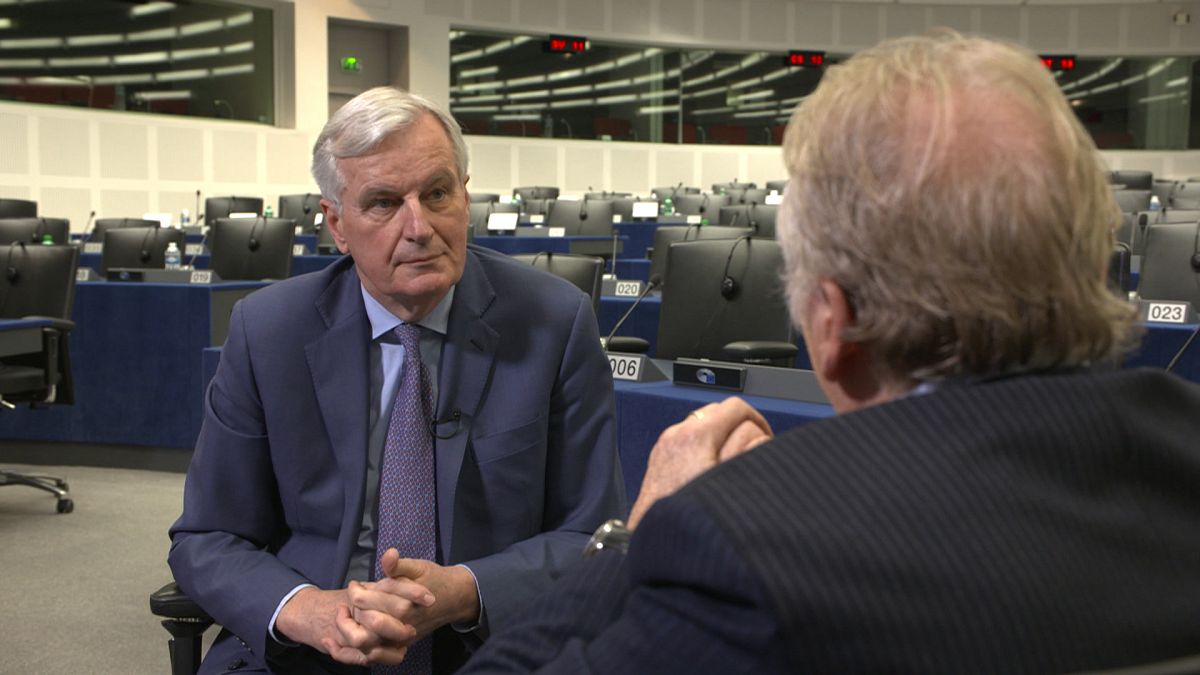In an exclusive Euronews interview talking to former European MP Daniel Cohn-Bendit, Barnier said the key question that needed to be answered was why Britain had chosen to leave the EU.
The European Union needs to do more to protect its citizens from globalisation, EU chief negotiator Michel Barnier told Euronews.
In an exclusive interview talking to former European MP Daniel Cohn-Bendit, Barnier said the key question that needed to answered was why Britain had chosen to leave the EU.
“You have to listen, you have to understand, you have to answer,” he said. “A large number of these voters voted in the same way you get in certain regions of France, Belgium, Italy or other countries. It is the feeling of being abandoned, the feeling of exclusion, the feeling that Europe doesn’t protect, that Europe is run by a bureaucracy that does not listen. I think we need to learn from Brexit. It's no doubt too late for the UK, but it's time to do it for others.”
Europe has behaved naively during the onset of globalisation
“I personally think that over the last 30 years Europe has often been naive in its trading relationships, that it made a fundamental mistake at the time when globalisation took off, with the explosion of the bipolar world that was very structured between the Soviet Union on one side and the United States on the other,” he said.
“We have seen lots of progress with the growth of globalization, many people have come out of extreme poverty. But at the same time, there was this idea that everything was now possible, it was laissez-faire, anything goes, ultra-liberalism. This is the fundamental mistake that has probably been made by many countries around the world, that we have been paying for, and have not finished paying for, since the financial crisis: the lack of global governance. I think it’s time we come back, as we have been doing for some years, to the founding principles of the social market economy. That’s three important words: social market economy. And not just two.”
Europe will now be strengthened by Brexit experience
“We must use the unity that we built over Brexit for a positive agenda,” he said. “Brexit is a negative agenda. But we have been united in this extraordinary negotiation. We need European leaders and that’s all of us - citizens are European leaders too — to use this unity for a positive agenda. And at the heart of this positive agenda is, in my opinion, Green Europe, which is a Europe that produces jobs and produces research.”
EU has not prioritised interests of bankers over citizens
Barnier, who was European Commissioner in the aftermath of the world financial crisis of 2008/2009, denied that the EU had prioritised the interests of bankers over ordinary citizens.
“No, that's not true,” he said. “First, the banks repaid what they were paid. And then they were saved in a hurry because saving banks saved savers too. And here I’m talking about people. Banks were forced to repay, that was the case. They have been forced to capitalize better to prepare for new crises because unfortunately there will be new crises. And then we protected financial consumers, who aren’t all very rich people, who are small savers. For example, we created the Basic Bank Account, because there are 20 million Europeans who don’t have a bank account, 9 million citizens who have been refused a bank account. I made a law that forces every European country, where it wasn’t already the case, to have a bank that enables anyone who needs one to open an account.
"I presented here in this Parliament and to the Council of Ministers 41 regulations to provide order, transparency, responsibility, morality and ethics where they were missing… for bankers and financial markets, who thought they were all allowed to do anything because they had been allowed to do anything. This is one of the lessons we’ve begun to learn from in recent years. And then there are other forms of protection. It’s time to talk about European defence policy. It’s time to better manage our external borders together. It's time to invest together. I'm not a protectionist. But I am for protection. And good protection is not protectionism. Good protection means investing together in education, research and innovation."
